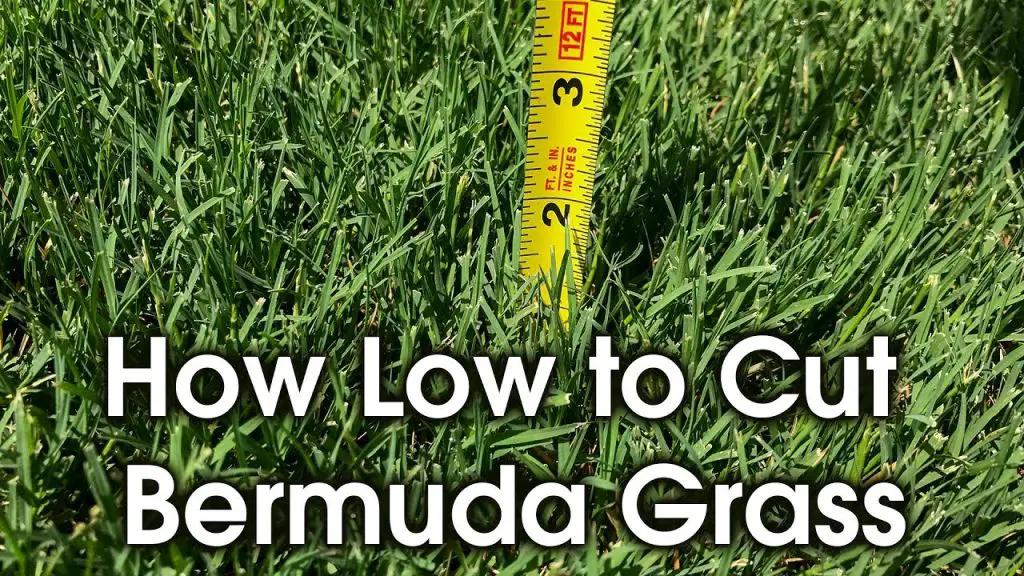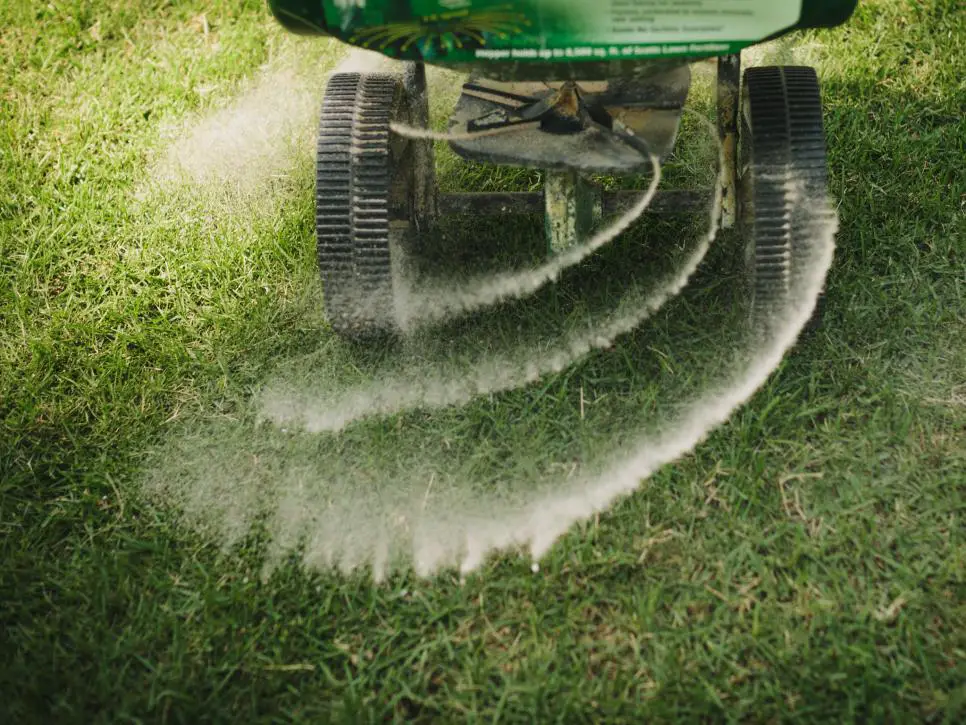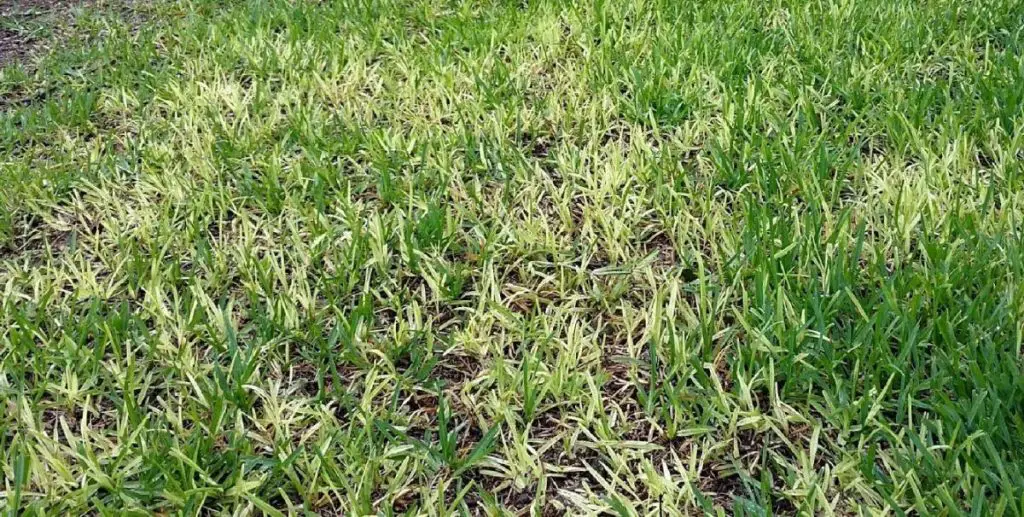When you look out at your yard, you might be wondering how to make Bermuda grass thicker. You are in luck. This hearty turfgrass grows quickly and can withstand heavy foot traffic. When properly cared for, any damaged areas can recover. Also known as crabgrass, Bermuda grass can grow where other grasses have slim survival chances. It can withstand long periods of heat and drought. For these reasons, Bermuda grass is used for a variety of reasons. While some use it for an easy species to cover their lawns, it is commonly used in golf courses, sports fields, and even for grazing cattle.
While the positives to Bermuda grass make it a commonly used species, you’ll need to tend to it properly to keep it growing thick.
Following these few simple steps will lead to a bright green lawn of thick Bermuda grass:
- Mow short and often
- Use an ample amount of the correct fertilizer
- Pre-treat for weeds and
- Remove any visible weeds
- Aerate the yard frequently, and treat any diseases or pests appropriately
- Remedy diseases
How to Make Bermuda Grass Thicker in 6 Steps
If you are wondering how to make Bermuda grass thicker in your own backyard, you can follow six easy steps. While you’ll have to invest a little money in the right products and invest a little time in proper care, you should see a big payoff. Caring for Bermuda grass to promote proper growth doesn’t take much more than any other lawn. The steps are just slightly altered according to this strong specie’s need. Take your time to read through the follow six steps to find helpful information to get your Bermuda grass lawn in tip top shape for the entire growing season.
1. Follow Targeted Mowing Techniques

If you want to have a thicker lawn, it is imperative that you follow the proper mowing techniques according to the species of grass you have. It may seem counter-productive to cut something that you want to get larger. Though, it must be done to maintain the health of your lawn.
Trim it short
- Bermuda grass needs to be trimmed short to encourage widespread coverage as opposed to lateral growth. You should cut Bermuda grass down to just under an inch tall. You will have to adjust your mower deck height accordingly, and you may even have to purchase a different kind of mower. Reel mowers will be great for this job, as they provide a clean cut to the blades. This reduces damage.
Mow it often
- To keep Bermuda grass at good heights, you may need to mow more frequently. Because Bermuda grass grows tall quickly, it can become overgrown before you know it. This blocks more of the sunlight at the base of the grass and prevents thicker growth from occurring. With other grass, you may only have to mow once every week or two.
- With Bermuda grass, you may have to mow once or twice per week. You should always water your lawn after mowing to prevent it from drying out.
2. Utilize the Correct Fertilizer

The start to any great lawn is giving it the right fertilizer. While it’s important to fertilize your lawn any time you are reseeding it, it’s also a great idea to continue with fertilizer treatments. This way you will get a lush texture and bright color for a longer period during growing months.
Use the Correct Fertilizer
- Fertilizing can also prevent weeds that will inhibit the growth of Bermuda grass as well as providing protection from drought. Finding the right fertilizer is key to promoting thick coverage of Bermuda grass.
- A 4-1-2 fertilizer is usually best. Four parts Nitrogen, one part Phosphorus, and two parts Potassium make up this common lawn solution. The University of Illinois has a great guide on choosing fertilizers for home lawns.
Use an Adequate Amount
- Making sure there is enough fertilizer will also help Bermuda grass grow thicker. Signs that your lawn is lacking the proper nutrients include yellowing, bare spots, and emerging weeds.
- You can perform a soil test to see exactly what your lawn is lacking. Be sure to fertilize your lawn periodically before damage has a chance to occur. This will keep your Bermuda grass growing thick with bright color for the entire season. The trick to lush grass growth is to provide a proper amount of nutrients continually to the soil.
3. Pre-treat for Weeds

You don’t want all your hard work of trimming, watering, and fertilizing to go to waste. Weeds can overtake Bermuda grass quickly. They choke and kill the root systems and block out sunlight at the shafts. This will eventually lead to bare patches. What can you do to prevent this kind of situation?
Use Pre-Emergent Weed Herbicides
- In early spring, use a pre-emergent weed herbicide. This will keep weeds from growing as the weather warms and foliage begins to grow.
- You can reapply this solution regularly to continue in your fight against weeds. Applying every 60-90 days will give you excellent assurance rates.
- The warmer months of June, July, and August will generally not need a pre-emergent weed herbicide to combat weed growth. Pick up a pre-emergent weed herbicide to tackle your problems.
Treat Different Weeds Appropriately
- Weeds that are the worst for Bermuda grass growth are quackgrass and crabgrass. These kinds of grass weeds are aggressive and can quickly overtake the healthiest of lawns without proper mitigation. It might be helpful to do further research on these two kinds of weeds, so you will know what to look for.
- If you couldn’t apply a pre-emergent weed herbicide, the best action is to treat any weed growth appropriately.
4. Remove Visible Weeds

If you look out upon your lawn and notice that you have visible weeds, you’ll want to act quickly before they have a chance to take over your Bermuda grass.
Pull out weeds by hand
- Weed growth can lead to yellowing and bare patches in your yard.
- While you can go out and pull up weeds by hand, this can be time-consuming and hard work.
- Uprooting weeds can be effective though if you are looking for a solution that doesn’t use chemicals (and if you have a lot of time on your hands or a rather small yard).
Use a Post-Emergent Weed Herbicide
- Applying a post-emergent weed herbicide can be beneficial in killing weeds without the back-breaking manual labor.
- A post-emergent weed herbicide does not need to be sprayed over the entire lawn. However, you will focus on the affected areas that have visible weed growth. This treatment option will work well for small areas of undesirable weeds. Still, if a larger portion of your lawn is affected, you might need to come up with a different plan. The root systems of some weeds can grow deep, making them hard to eradicate. If you are facing a big weed problem, you might want to consider applying a pre-emergent weed herbicide year in early spring to help prevent the same issues.
5. Encourage Growth Through Aerating

When your soil becomes dry and hardened, it becomes difficult for water to penetrate deeply. This leaves the root systems of Bermuda grass without water, leading to premature death. In areas of heavy traffic, the soil can become packed tightly. This prevents roots from growing outward which leads to thicker growth of Bermuda grass.
When to aerate
- Typical times of the year to aerate your lawn are during late spring and early summer.
- Bermuda grasses, however, should be aerated when the growth turns green. This promotes healthy root growth and moisture penetration.
Extra aerating times
- If you want to go the extra mile, you can also aerate Bermuda grass just after trimming.
- You’ll need to aerate your soil earlier in the year if you have clay soil or if your yard is hard-packed. Late winter, once the ground has fully thawed, is the perfect time to begin aerating for great growth of your Bermuda grass.
- If you follow proper aeration techniques, your lawn should get great coverage with healthy growth. Your lawn may also be less susceptible to drought due to the amount of water able to penetrate deep in the soil. This means water can reach even the lowest grown root systems. Discover more on proper aerating here.
6. Remedy Diseases

If you’ve done everything previously mentioned but still see areas of your Bermuda grass not growing properly, you could be facing a lawn disease. Common diseases affecting Bermuda grass are brown patch disease, dollar spot, and spring dead spot. These are all fungal diseases that lead to premature death and thinning. This begins in the fall even though you may not see the results until spring. Too much nitrogen is usually the cause.
Treating fungal diseases
- You will have to treat these areas to promote the grass to regrow, or you may need to reseed these spots once the disease is gone.
- Apply a fungicide to kill the fungi first. Then, you can decide how to act next.
Treating root rot
- Root rot is another common disease that affects Bermuda grass leading to thinning. This stems from not properly aerating the soils. Aerate more regularly to combat this issue. This is especially important if your soil is clay. Follow our tips above on aerating for thicker grow of your Bermuda grass.
- Grubs and Japanese Beetles will also lead to thinner Bermuda grass lawns. Applying nematodes to the yard to combat grubs naturally. You can also use a solution of 2 tablespoons of liquid dishwashing soap diluted in 1 gallon of water for every 1,000 square feet of yard. Spray the yard once per week until you see no more grubs.
How to Make Bermuda Grass Thicker in Shade

If you’ve even done any reading on Bermuda grass, you’ve probably come across information regarding shade. Bermuda grass can do very well in areas of high shade. Still, you should do your best to prevent full shade areas.
Tips for shade
- You can do this by cutting down tall shrubs or trees that are blocking the sunlight from reaching certain areas of your yard.
- Whenever you can’t remove a tree, you should consider trimming back some of the branches to provide a canopy. Dappled sunlight is better than no sunlight at all for Bermuda grass.
- When you can’t provide more sunlight to shaded areas, there are other things you can do to protect your Bermuda grass from damage in full shade. Start by trying not to walk in these areas and keep pets out of this area to further decrease foot traffic.
- Trim these sections less often or set the mower blades higher. This gives these blades of grass more surface area for photosynthesis to occur.
- If all else fails, and the Bermuda grass dies in the shaded locations of your yard, consider planting a more shade resistant grass or ornamental grass alternative. You can refer to our guide on the Best Shade Tolerant Grass for more details.
How to Make Bermuda Grass Thicker – Summary
If you notice that your Bermuda grass is not growing the way it should, don’t panic. There are easy steps you can take to promote healthy growth. Following the six simple steps we’ve outlined can help you prevent damage that causes grass to brown and thin. Mow the lawn regularly, trimming the grass to a height slightly under an inch tall. Fertilize using a 4-1-2 mixture at the correct times of year and again as needed. Pretreat for weeds and remove weeds that appear. Remedy any disease that occurs. Aerate your soil regularly. With this easy regimen, your Bermuda grass should be growing in thick and in vivid green.
If all else fails, consider reseeding. Sometimes, a fresh start is all you need when a lawn has become damaged beyond repair. Consider planting a more shade resistant grass or another alternative where needed in spots with little direct sunlight. Once you get to work and make a habit out of caring for your lawn, you should become an expert on how to make Bermuda grass thicker. A little time and practice are all it takes.
We recommend products from companies like Amazon, which we also get a small commission from, to keep this website running. However, we want to stress that all of the products we recommend are tested, used by us, and 100% unbiased and true.

